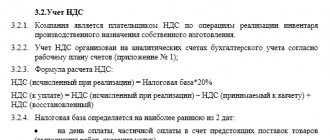Choosing the correct accounting method
The updated version of PBU 1/2008 more specifically establishes the rules for choosing an accounting method: federal accounting standards must be followed, as before, and if there are alternative methods, the organization has the right to choose one of the existing ones.
What to do if there is not a single suitable method in federal standards? The answer is very logical - to develop your own, new method, guided by the following documents: international financial reporting standards (IFRS), then federal and industry standards, and, as a last resort, recommendations in the field of accounting. These provisions are contained in a new, specially created clause 7.1 of PBU 1/2008, because before this this list of actions was not officially established.
An accounting policy is a set of accounting methods selected from those approved and prescribed at the legislative level that your organization follows. If something is not stipulated in the legislation, the organization itself thinks through all the nuances, also enshrining them in the accounting policy. It is drawn up immediately, during the creation of the organization, while being adjusted during the introduction of changes to it, previously approved by order.
When are these adjustments needed? Firstly, when the standards of Russian legislation themselves change. Secondly, if you have developed a new, more efficient way of keeping records that improves the quality of information provided. And, of course, if the activities of your organization have changed significantly. As a rule, any planned changes for the coming year are approved in December.
What has changed in accounting policies
Freedom to choose accounting policies
Each organization develops and approves specific accounting methods and accounting practices independently, taking into account the specifics of its activities. An organization chooses accounting methods regardless of the choice of accounting methods by other organizations. This rule is now directly enshrined in PBU 1/2008 (previously it was provided only by paragraph 2 of Article 8 of the Federal Law of December 6, 2011 No. 402-FZ “On Accounting”).
At the same time, amendments to PBU significantly limit the right to choose the accounting policies of subsidiaries.
Now clause 5.1 of PBU 1/2008 states that if the parent company approves its accounting standards, which are mandatory for use by its subsidiary, then such subsidiary chooses accounting methods based on these standards. Thus, if the accounting methods of a subsidiary contradict those of the parent organization, the subsidiary is required to change its accounting policies.
Changing the rules for forming accounting policies
Amendments to PBU clarified the procedure for organizations to formulate their accounting policies in terms of choosing the method of accounting for a particular item (clause 7 of PBU 1/2008). So, if the federal accounting standard (FSBU) establishes one method of accounting for a specific issue, the organization must choose and write it down in the policy. If the FSB establishes several possible methods, then the organization has the right to choose any method that will provide more accurate and correct accounting of objects.
At the same time, in practice, situations are possible in which the Federal Accounting Standards do not contain acceptable accounting methods for a specific issue at all. In these cases, the Ministry of Finance recommends that you follow the rules enshrined in clause 7.1 of PBU 1/2008.
It says here that if the FAS does not have an accounting method, the organization itself must develop it and consolidate it in its accounting policies. To do this, the PBU introduced a sequence of using various sources to develop similar accounting methods:
- international accounting standards;
- FSBU on similar issues;
- recommendations in the field of accounting.
Thus, organizations that independently develop accounting methods and methods will first of all have to be guided by IFRS. If IFRS does not contain the necessary accounting methods, then the organization must rely on the provisions of the Federal Accounting Standards on similar and related issues. If the FSB does not regulate controversial issues, then a specific accounting method can be developed based on recommendations in the field of accounting.
Irrelevant information
Organizations received the right to independently develop accounting methods for certain objects (clause 7.4 of PBU 1/2008). We are talking about the so-called “immaterial information” - information, the presence or absence of which in the financial statements does not affect the economic decisions of the users of these statements. For example, this could include information about the amount of office supplies and hygiene products consumed by the organization.
Based on such information, the organization has the right to choose the method of accounting, guided solely by the requirement of rationality. Organizations have the right not to apply either FAS or IFRS in these cases. Moreover, the organization independently classifies information as non-essential based on both the size and nature of this information.
Application of international standards
Organizations were allowed to formulate accounting policies taking into account the requirements of IFRS. This applies to organizations that disclose:
- consolidated financial statements;
- financial statements prepared in accordance with IFRS of an organization that is not creating a group.
If the use of some method of accounting according to the Russian standard contradicts IFRS, then the organization has the right not to apply the Russian standard. At the same time, for each method not used, the organization is obliged to disclose the following information in its reporting:
- description of the unused method;
- IFRS requirement that will be violated if the accounting method established by the Russian federal standard is applied.
Deviation from general rules
In exceptional cases, organizations were allowed not to apply federal standards if their application leads to inaccuracies and errors in accounting (clause 7.3 of PBU 1/2008). If an organization exercises this right, it will need to reflect in its reporting:
- the name of the standard establishing the accounting method from which the organization has deviated;
- circumstances as a result of which the application of the general procedure leads to errors and unreliable information about the financial position of the organization;
- the content of the alternative method of accounting used by the organization;
- the values of all indicators of the accounting (financial) statements of organizations that were changed as a result of deviations from the general procedure.
That is, if an organization cannot keep correct records of any object according to the general rules of standards, it will be able to deviate from these rules and apply alternative ones, fixing this fact in its policy.
Thus, as can be seen from the order of the Ministry of Finance of Russia dated April 28, 2017 No. 69n, amendments to the accounting policies for accounting purposes do not affect most organizations that are guided by the usual PBU/FSBU. Mainly, the changes concern the following subjects:
- organizations with subsidiaries;
- organizations applying IFRS;
- organizations submitting consolidated statements;
- organizations with objects whose accounting methods are not directly established in the FAS and IFRS.
It is they who need to adjust their accounting policies to take into account the new requirements by issuing an appropriate management order. Other organizations, whose accounting policies do not directly contradict the updated edition of PBU 1/2008, may not change anything.
Simplified way of accounting
Explanations are also provided for organizations that use the simplified tax system and submit simplified reporting. These include non-profit organizations, small businesses (regardless of the taxation system they choose) and participants in the Skolkovo project. The above organizations are required to apply the accounting methods established by federal standards and, if there are several of them, choose one of the existing ones. Again, as mentioned above, if there is no suitable method, you can develop your own, more suitable and more rational.
I would like to additionally mention that the concept of “the requirement of rationality” itself has also undergone changes! Previously, this term meant that accounting should be conducted based on business conditions and the size of the organization. Now an addition has been developed, clarifying that the requirement of rationality, in addition to this, also includes the ratio of the costs of generating information and its usefulness (new edition of clause 6 of PBU 1/2008).
Consolidated reporting
Paragraph 7 of PBU 1/2008 describes the rule according to which organizations that keep records and prepare reports in accordance with IFRS have the right to take into account, in addition to federal standards, also IFRS standards.
But in addition to this, if any accounting method established by the federal standard contradicts the requirements of IFRS, then the organization has the right not to apply it. However, the company must explain why these methods are not consistent with each other by describing them in detail.
Irrelevant information
Now PBU 1/2008 has introduced a new definition - non-essential information. What does it mean? This information, the existence, absence or manner of reflection of which does not in any way affect economic decisions, is now called “irrelevant”. The organization itself determines what information is immaterial based on its size and nature. Clause 7.4 of PBU 1/2008 contains instructions for the case when the management of federal standards or the creation of new standards leads to the appearance of non-essential information. In such a situation, the accountant himself chooses accounting methods, that is, without applying standards. And yes, please note: this rule applies to all organizations.
Procedure for changing accounting policies
Changes to the accounting policy must be justified and approved by order or order of the head of the enterprise. Additional approval of changes (for example, by the tax authorities) is not required. The order must indicate:
- what provisions (clauses) of accounting or tax policies are changing,
- provide in the order or in an appendix to it the text of the amended or new provision
- indicate the date from which the changes come into force - if the reason for the changes is related to legislative amendments, then the date will coincide with the day the legislative amendments come into force, in other cases the changes will come into force on January 1 of the year following the year of their approval.
Information about changes in accounting policies must be reflected in the accounting (financial) statements of the enterprise. The following are subject to disclosure (clause 21 of PBU 1/2008):
- the reason for the change in accounting policy,
- content of the change,
- the procedure for reflecting the consequences of changes in accounting statements,
- the amount of adjustments due to changes for each accounting item for each reporting period presented,
- the amount of the adjustment (to the extent possible) for the reporting periods preceding those presented.
In general, PBU 1/2008 provides for a retrospective procedure for applying changes (except for those related to changes in legislation), when it is assumed that a change in the organization’s accounting policy is applied from the moment the corresponding fact of the enterprise’s economic activity arises. To do this, the initial balance under the item “Retained earnings (uncovered loss)” of the earliest period presented in the accounting statements is adjusted and other items related to the adjustment are recalculated.
In the event that changes in accounting policies cannot be reflected for past periods, changes in accounting are applied only to transactions carried out after the introduction of the changes, that is, prospectively (clause 15 of PBU 1/2008).
It is this promising method that can be used by enterprises that conduct simplified accounting and submit accounting reports using simplified forms to reflect in their reporting the consequences of changes in accounting policies (clause 15.1 of PBU 1/2008).
When amendments to the law, PBU, Tax Code of the Russian Federation, etc. the mandatory use of a specific method of accounting is approved; the enterprise is obliged to use it, even if it has not changed its accounting policies.
Accounting policy for tax accounting purposes
For tax accounting purposes, all rules for drawing up accounting policies are fixed and spelled out in the Tax Code of the Russian Federation.
Before moving on to the innovations of the current year, let's look at the changes that came into force in 2021:
- It is now possible to select a base on the basis of which the maximum possible amount of the reserve for doubtful debts is determined. At the same time, the volume of the reserve for doubtful debt in the presence of a counter-obligation does not exceed an amount greater than this counter-obligation.
- The 10-year restriction on the transfer of losses to a future period no longer applies, but the amount should not exceed 50% of the current tax base (clauses 2, 2.1 of Article 283 of the Tax Code of the Russian Federation).
- For the period from 2021 to 2021. tax amounts are distributed among budgets in the following proportions: 17% to the regional budget, 3% to the federal budget (Clause 1 of Article 284 of the Tax Code of the Russian Federation).
- The list of energy-efficient facilities for which accelerated depreciation can be applied has been expanded (Resolution of the Government of the Russian Federation dated August 25, 2017 No. 1006).
- The new OKOF classifier (OK 013-2014) came into effect, which, in turn, affected the classification of fixed assets put into operation after 2021 by depreciation groups.
If we talk about 2021 - Ch. 25 of the Tax Code of the Russian Federation has been updated once again. At the same time, these innovations do not require making decisions about the choice of accounting method - they mainly clarify existing rules that did not affect all taxpayers and boil down to the following:
- The list of income that is not taken into account when determining the tax base has been supplemented with income in the form (subclauses 3.6 and 3.7, clause 1, article 251 of the Tax Code of the Russian Federation):
- property rights to the results of intellectual activity identified during the inventory;
- property objects or rights (property or non-property) received as a contribution to the property of a legal entity.
- Income of non-profit organizations providing financial support for the overhaul of apartment buildings from the temporary placement of available funds (subclause 38, clause 1, article 251 of the Tax Code of the Russian Federation) is no longer considered income, which is not taken into account when determining the tax base.
- Services for the provision of guarantees by legal entities other than banks are classified as income that are not taken into account when determining the tax base, but only if they are gratuitous (subclause 55, clause 1, article 251 of the Tax Code of the Russian Federation).
- Between 2021 and 2022. water supply and sanitation facilities included in the special list have now been supplemented with the list of facilities for which accelerated depreciation can be applied (subclause 4, clause 2, article 259.3 of the Tax Code of the Russian Federation).
- Accounting for R&D expenses has undergone some changes:
- For the period 2018–2021 it is allowed to include expenses for the acquisition of exclusive rights to new developments and the rights to use them for R&D purposes (subclause 3.1, clause 2, article 262 of the Tax Code of the Russian Federation);
- R&D costs allowed to be written off as other expenses with a coefficient of 1.5 can now, with the same condition, be included in the cost of depreciable intangible assets created with the exclusive right to them (clause 7 of Article 262 of the Tax Code of the Russian Federation).
- Funds that are transferred free of charge to the budget of the Russian Federation under the agreement of targeted contributions for the electric power industry (subclause 48.9, clause 1, article 264 of the Tax Code of the Russian Federation) are now included in other expenses associated with production and sales.
Also, starting this year, changes have affected organizations that apply the “5 percent rule.” From January 1, 2021, companies must maintain separate VAT accounting in a new way - VAT can be deducted on purchases that relate to both taxable and non-taxable transactions if the share of expenses on non-taxable transactions is no more than 5% ( clause 4 of article 170 of the Tax Code). In addition, organizations will not be able to deduct input VAT on purchases of only non-taxable transactions, regardless of the share of expenses for these transactions. Now the Tax Code of the Russian Federation has established a rule: if expenses for non-taxable activities are less than 5%, then VAT on mixed expenses can be fully deducted (Federal Law dated November 27, 2017 No. 335-FZ). If expenses relate only to non-taxable activities, then VAT must be taken into account against the company’s expenses (clause 4 of Article 170 of the Tax Code).
Accounting policy 2018
The accounting policy for 2021 should be formed taking into account changes in taxation, and taking into account changes in rules and new accounting methods. So, let's look at the possibilities for managing accounting policies in 2021.
Accounting policy is a set of accounting and tax accounting methods chosen by the organization.
A company can influence financial results within the framework of its accounting policies in various ways:
- regulation of asset valuation;
- distribution of income and expenses between adjacent reporting periods;
- choice of tax payment methods, etc.
And most often it does not change, since changes in the PBU are minimal.
But 2021 is different from other periods. Changes to PBU 1/2008 were made this year and came into force on August 6, 2017. In general, the changes are related to the general trends of transition to international standards.
Firstly, this PBU will have to be applied by individual entrepreneurs providing legal services, as well as notaries and private practitioners, who must keep records in accordance with the legislation of the Russian Federation.
Secondly, new requirements for accounting policies have been established.
Let us remind you that the accounting policy must meet the following requirements:
- completeness requirement;
- timeliness requirement;
- requirement of diligence;
- requirement of priority of content over form;
- requirement of rationality.
The rationality requirement has now been adjusted. Rational accounting should be carried out based on business conditions and the size of the organization. Provided that the information generated in accounting is useful enough to justify the costs of its generation. Organizations conducting simplified accounting, in the absence of methods for conducting accounting on a specific issue in federal accounting standards, have the right to be guided by the requirement of rationality.
Thirdly, the organization chooses accounting methods regardless of the choice of accounting methods by other organizations. In addition, if the parent company approves its accounting standards, which are mandatory for use by its subsidiary, then the subsidiary chooses accounting methods based on these standards.
GOOD TO KNOW
Accounting policy is understood as a set of accounting methods adopted by the entity - primary observation, cost measurement, current grouping and final generalization of the facts of economic activity.
How to develop a new accounting method?
Changes in accounting policies may be made under the following conditions:
1) when the requirements established by the legislation of the Russian Federation on accounting, federal and (or) industry standards change;
2) when developing or choosing a new method of accounting, the use of which leads to an increase in the quality of information about the object of accounting;
3) in case of a significant change in the conditions of activity of an economic entity (Article 8 of the Federal Law of December 6, 2011 No. 402-FZ (as amended on May 23, 2016) “On Accounting”).
According to PBU 1/2008, when developing a new accounting method, it is necessary, based on the assumptions and requirements of paragraphs. 5 and 6 of the new PBU 1/2008, it is mandatory to consistently use the following sources:
1. IFRS.
2. Rules of all-Russian and/or industry accounting standards on similar issues.
3. Recommendations for accounting.
In practice, new accounting methods depend on contracts and the tasks that the company sets for itself.
According to PBU 1/2008, the consequences of changes in accounting policies should be reflected in one of the following ways:
- retrospectively - in this case, they proceed from the assumption that the changed method of accounting was applied from the moment the facts of economic activity of this type arose. Retrospective reflection of the consequences of a change in accounting policy consists of adjusting the opening balance under the item “Retained earnings (uncovered loss)” for the earliest period presented in the financial statements, as well as the values of related financial statements items disclosed for each period presented in the financial statements, as if the new accounting policy was applied from the moment the facts of economic activity of this type arose;
- prospectively - in cases where the assessment in monetary terms of the consequences of a change in accounting policy in relation to periods preceding the reporting period cannot be made with sufficient reliability, the changed method of accounting is applied to the relevant facts of economic activity that occurred after the introduction of the changed method.
If income is related to work or services that are carried out in more than one tax period or take place in two tax periods at once (for example, started in September 2016 and completed in February 2021), then they must be distributed between periods, but only in that if the contract with the customer does not provide for phased delivery of work (clause 2 of article 271 of the Tax Code of the Russian Federation).
There are several distribution methods. Most often, organizations distribute income:
- evenly by dividing by the number of reporting periods in which the agreement is valid;
- in proportion to the costs incurred. In this case, you need to draw up an estimate of the costs of implementing this agreement.
It is advisable to distribute long-term income in proportion to the expenses incurred, since in this case, if in any period the organization had no expenses, then it will not have taxable profit.
As you know, production and sales costs are divided into direct and indirect.
According to paragraph 1 of Art. 318 of the Tax Code of the Russian Federation, direct expenses include:
- costs of purchasing raw materials and supplies used in the production of goods (performance of work, provision of services);
- costs for the purchase of components and semi-finished products;
- expenses for remuneration of production personnel, as well as the amount of contributions accrued on them;
- depreciation expenses for fixed assets used in the production of goods, works, and services.
GOOD TO KNOW
Currently, an organization can independently establish a list of direct expenses different from that provided for in Art. 318 Tax Code of the Russian Federation. She must consolidate this list in her accounting policies.
The amount of material expenses when writing off raw materials and materials, as well as purchased goods and securities of the organization is determined in accordance with the valuation method adopted in the accounting policy (clause 8 of Article 254 of the Tax Code of the Russian Federation).
The following assessment methods are used:
- by cost per unit of inventory;
- at average cost;
- at the cost of the first acquisitions (FIFO).
In order to choose the optimal method for valuing raw materials, you need to analyze the dynamics of market prices and, based on various factors (for example, the increase in fuel prices predicted by experts), determine price prospects in the near future.
The chosen method is better reflected in the accounting policy adopted for both taxation and accounting purposes; as a result, there is no need to keep records twice.
Regarding the element of the accounting policy “Accrual of depreciation on fixed assets”, it should be noted that the most appropriate method for optimizing the amount of property tax is the non-linear method. At the same time, the use of a non-linear method of calculating depreciation charges in the first years provides savings on both property tax and income tax. In general, savings are obtained not so much in terms of amount as in terms of cash flows.
In order to reduce the taxable profit of the current period and evenly allocate expenses in tax accounting, organizations using the accrual method have the right to create the following reserves. The most common:
- for doubtful debts (Article 266 of the Tax Code of the Russian Federation);
- for warranty repairs and warranty service (Article 267 of the Tax Code of the Russian Federation);
- for the repair of fixed assets (Article 324 of the Tax Code of the Russian Federation);
- upcoming expenses
The listed reserves have much in common:
- creating a reserve is a right, not an obligation of the organization;
- the decision to create a reserve must be fixed in the accounting policy;
- if a reserve is formed, then the corresponding costs can be written off only from the created reserve.
Doubtful debts include obligations to the taxpayer that are not repaid within the time limits established by the agreement and are not secured by a pledge, surety or bank guarantee. If such debts arise, the taxpayer has the right to create a reserve for doubtful debts. The amount of the specified reserve is included in non-operating expenses on the last day of the reporting period, therefore, reduces the tax base for income tax:
- the period of occurrence exceeds 90 days – 100% of the amount of the obligation is included;
- period more than 45 but less than 91 days – 50% of the amount of the obligation.
In addition, the amount of the created reserve for doubtful debts cannot exceed 10% of the revenue of the reporting (tax) period.
GOOD TO KNOW
The reserve is formed quarterly at the end of each reporting (tax) period until the debts are repaid or written off as bad.
You can turn bad debts into doubtful ones to increase the amount of the reserve for doubtful debts, for example, by receiving from the debtor any type of document (protocol, letter, notification) containing information that the debtor acknowledges the debt. In connection with the receipt of such a document, the limitation period is interrupted and a new one begins (that is, plus three years) in accordance with Art. 203 Civil Code of the Russian Federation.
The amount of increase in the reserve compared to the previous period is attributed to non-operating expenses, and the amount of decrease is attributed to non-operating income. The reserve for doubtful debts can only be used to cover losses on bad debts.
You can also organize work with losses in your accounting policy.
If the financial result of an organization’s activities for a tax period is not a profit, but a loss, then the organization has the right to transfer this loss to the future. Carrying forward a loss means that the amount of the loss (partially) can be used to reduce the taxable profit of the following reporting (tax) periods.
The amount of losses can be taken into account in reducing the tax base for 10 years.
The disadvantage of carrying forward losses may be the absence of a reason for application in connection with the receipt of new losses by the enterprise.
IMPORTANT IN WORK
Starting from the 2021 reporting period, the procedure for carrying forward such losses has changed. From 2021, you can only carry forward losses of 50%. This is important for those who apply the object of taxation “income reduced by the amount of expenses.”
A loss from the sale of an asset is formed if the residual value of the depreciable property, taking into account the costs associated with its sale, exceeds the proceeds from the sale of the asset. The amount of loss from the sale of an asset is determined as of the date of the transaction (Article 323 of the Tax Code of the Russian Federation). The taxpayer has the right to write off losses starting from the month following the month in which the property was sold.
The loss is included in other expenses in equal shares over a period calculated as the difference (in months) between the useful life of the property and the actual period of its operation until the moment of sale.
The amount of loss taken into account by the original creditor (seller of goods, works, services, creditor under a debt obligation) depends on when the assignment was made:
- before the payment deadline stipulated by the contract for the sale of goods, works, services (hereinafter referred to as the main contract);
- or after this period.
If, in accordance with the provisions of Ch. 29 of the Civil Code of the Russian Federation, such a period was changed before the date of assignment of the right of claim (including unilaterally), the payment period is determined taking into account this change (letter of the Ministry of Finance of Russia dated January 20, 2014 No. 03-03-06/2/1395, dated December 29. 2008 No. 03-03-06/2/181, dated 16.09.2008 No. 03-03-06/1/123).
Example 1.
The organization suffered a loss:
- at the end of 2014 - in the amount of 900,000 rubles;
- at the end of 2015 – in the amount of RUB 1,200,000.
In 2021, the organization operated with a profit, which cumulatively from the beginning of the year amounted to:
- for the first quarter – 470,000 rubles;
- for the six months – 940,000 rubles;
- for 9 months – 1,500,000 rubles;
- per year – 1,900,000 rubles.
In the first quarter of 2021, the organization made a profit of 300,000 rubles.
When calculating the tax base, an organization has the right to take into account:
- for the first quarter of 2021 - part of the loss for 2014 in the amount of 470,000 rubles;
- for the first half of 2021 - the entire loss for 2014 in the amount of RUB 900,000. and part of the loss for 2015 in the amount of 40,000 rubles. (940,000 rub. – 900,000 rub.);
- for 9 months of 2021 – loss for 2014 in the amount of RUB 900,000. and part of the loss for 2015 in the amount of RUB 600,000. (RUB 1,500,000 – RUB 900,000);
- for 2021 – loss for 2014 in the amount of RUB 900,000. and part of the loss for 2015 in the amount of RUB 1,000,000. (RUB 1,900,000 – RUB 900,000).
Thus, the organization does not have to pay advance payments and taxes for 2021. The balance of the uncarried loss for 2015 as of 01/01/2017 will be 200,000 rubles. (RUB 1,200,000 – RUB 1,000,000).
When calculating the advance payment for the first quarter of 2021, profit can be reduced by 150,000 rubles. (300,000 x 50%).
GOOD TO KNOW
The accounting policy of an economic entity is formed by the chief accountant or another person who, in accordance with the legislation of the Russian Federation, is entrusted with maintaining accounting records, and is approved by the head.
Basic elements of accounting policy for the “simplified”
In relation to enterprises that have switched to a simplified taxation system, there is an independent problem of establishing accounting policies.
In the case where the object of single taxation is income, there is no need to establish any elements of accounting tax policy. If the object is income reduced by the amount of expenses, then such a need may certainly arise, since the determination of the cost part of the tax base of Ch. 26.2 of the Tax Code of the Russian Federation directly connects with the principles of formation of expenses for profit tax purposes under Chapter. 25 Tax Code of the Russian Federation.
Accordingly, “simplers” must take into account income and expenses as elements of accounting policy, focusing on the Tax Code, which will reduce the differences between tax and accounting accounting.
It is also important to determine the accounting procedure for property. Property is accounted for on account 01. If we are talking about low-value property, then it is accounted for on account 10.
For tax purposes, when calculating property tax, the tax base is determined based on:
a) from the average annual cost (without taking into account the monetary assessment of future costs) of movable and immovable property (including property transferred for temporary possession, use, disposal or trust management contributed to joint activities, under an investment partnership agreement), recorded on the balance sheet as objects fixed assets and the balance sheet reflected in the asset for the following accounting accounts in accordance with the organization’s working chart of accounts for the current year;
b) from the cadastral value as of January 1 of the tax period in relation to individual real estate objects.
It is important to ensure separate accounting of property:
1) immovable;
2) real estate, the tax base for which is determined in accordance with Art. 378.2 Tax Code of the Russian Federation;
3) movable, registered as fixed assets before January 1, 2013;
4) movable, registered after January 1, 2013.
In the accounting policy, you can maintain separate accounting by:
- reflections on a separate subaccount of the accounting account;
- selection of these objects in analytical accounting).
If the company has vehicles, it is recommended to drive:
a) separate accounting of the following vehicles, which are and are not subject to transport tax;
b) separate allocation in the accounting of passenger cars with an average cost of 3 million rubles.
The fact is that cars costing more than 3 million rubles. are taxed at higher rates.
For accounting purposes, it is important to determine who will sign the accounting policy; this responsibility is:
- assigned to the chief accountant (or another official must be selected);
- carried out on a contractual basis with a centralized accounting department, a specialized organization or a specialist accountant;
- carried out personally by the head of the organization (in relation to entities using simplified accounting methods, including simplified accounting (financial) statements, medium-sized businesses, with the exception of economic entities specified in Part 5 of Article 6 of Law No. 402-FZ).
GOOD TO KNOW
If the company independently develops primary documents, then they must be attached to the accounting policies. Similarly, it is necessary to reflect the features of electronic document management in the accounting policy.
How accounting policies affect the object of taxation
If a company uses the “income” object, then, in practice, it pays little attention to expenses, and the accounting policy does not need to specify the specifics of their implementation.
When determining the tax base, the following income is not taken into account:
1) in the form of property, property rights, works or services that are received from other persons in the order of advance payment for goods (works, services) by taxpayers who determine income and expenses on an accrual basis;
2) in the form of property, property rights that are received in the form of a pledge or deposit as security for obligations;
3) in the form of property, property rights or non-property rights with a monetary value, which are received in the form of contributions (contributions) to the authorized (share) capital (fund) of the organization (including income in the form of excess of the placement price of shares (shares) over their nominal value (original size));
4) in the form of property, property rights or non-property rights in the amount of their monetary value, which are transferred to a business company or partnership in order to increase net assets, including through the formation of additional capital and (or) funds, by the relevant shareholders or participants.
And others named in Art. 251 Tax Code of the Russian Federation.
GOOD TO KNOW
If a company applies the object of taxation “income reduced by the amount of expenses,” then it is necessary to pay special attention in its accounting policy to the issues of accounting for expenses.
When determining the object of taxation, the taxpayer reduces the income received by the expenses specified in Art. 346.16 Tax Code of the Russian Federation. But expenses that are not listed in the Tax Code of the Russian Federation in the chapter regarding the simplified tax system should not be included in the accounting policy, since such expenses will not be recognized for tax purposes. For example, such expenses may include deferred expenses.
It is also important to consider that a number of expenses cannot be taken into account at all.
The following expenses are not taken into account for tax purposes:
- in the form of penalties, fines and other sanctions transferred to the budget (to state extra-budgetary funds);
- in the form of a contribution to the authorized (share) capital, a contribution to a simple partnership;
- in the form of a tax amount, as well as the amount of payments for excess emissions of pollutants into the environment;
- in the form of interest accrued by the taxpayer-borrower to the creditor in excess of the amounts recognized as expenses;
- in the form of property (including money) transferred by the commission agent;
- in the form of the cost of gratuitously transferred property (work, services, property rights) and expenses associated with such transfer;
- in the form of funds transferred to trade union organizations;
- in the form of expenses for any types of remuneration provided to management or employees in addition to remuneration paid on the basis of employment agreements (contracts);
- in the form of property or property rights transferred as a deposit or pledge;
- other expenses according to Art. 270 Tax Code of the Russian Federation.
Standardized expenses occupy a special place.
GOOD TO KNOW
When developing an accounting policy, the requirements listed in clause 6 of PBU 1/2008 should be met.








